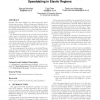Free Online Productivity Tools
i2Speak
i2Symbol
i2OCR
iTex2Img
iWeb2Print
iWeb2Shot
i2Type
iPdf2Split
iPdf2Merge
i2Bopomofo
i2Arabic
i2Style
i2Image
i2PDF
iLatex2Rtf
Sci2ools
WWW
2010
ACM
2010
ACM
Mind the data skew: distributed inferencing by speeddating in elastic regions
Semantic Web data exhibits very skewed frequency distributions among terms. Efficient large-scale distributed reasoning methods should maintain load-balance in the face of such highly skewed distribution of input data. We show that term-based partitioning, used by most distributed reasoning approaches, has limited scalability due to load-balancing problems. We address this problem with a method for data distribution based on clustering in elastic regions. Instead of assigning data to fixed peers, data flows semi-randomly in the network. Data items “speed-date” while being temporarily collocated in the same peer. We introduce a bias in the routing to allow semantically clustered neighborhoods to emerge. Our approach is self-organising, efficient and does not require any central coordination. We have implemented this method on the MaRVIN platform and have performed experiments on large real-world datasets, using a cluster of up to 64 nodes. We compute the RDFS closure over differ...
Internet Technology | Large-scale Distributed Reasoning | Semantic Web Data | Skewed Frequency Distributions | WWW 2010 |
| Added | 14 May 2010 |
| Updated | 14 May 2010 |
| Type | Conference |
| Year | 2010 |
| Where | WWW |
| Authors | Spyros Kotoulas, Eyal Oren, Frank van Harmelen |
Comments (0)

